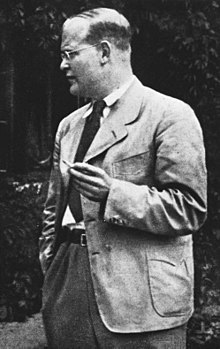
Back Dietrich Bonhoeffer ALS ديتريش بونهوفر Arabic ديتريش بونهوفر ARZ Dietrich Bonhoeffer AST Дзітрых Банхёфер Byelorussian Дитрих Бонхьофер Bulgarian Dietrich Bonhoeffer Catalan Dietrich Bonhoeffer Czech Dietrich Bonhoeffer Welsh Dietrich Bonhoeffer Danish
Dietrich Bonhoeffer | |
|---|---|
 Bonhoeffer in his garden in Berlin | |
| Born | 4 February 1906 |
| Died | 9 April 1945 (aged 39) |
| Cause of death | Execution by hanging |
| Education | Staatsexamen (Tübingen), Doctor of Theology (Berlin), Privatdozent (Berlin) |
| Alma mater | University of Tübingen University of Berlin |
| Father | Karl Bonhoeffer |
| Relatives | Hans von Dohnanyi (brother-in-law) |
| Religion | Lutheranism |
| Church | Evangelical Church of the old-Prussian Union (1906–1933) Confessing Church (1933–1945) |
Congregations served | Zion's Church congregation, Berlin German-speaking congregations of St. Paul's and Sydenham, London |
Offices held | Associate lecturer at Frederick William University of Berlin (1931–1936) Student pastor at the Technische Hochschule in Berlin (now Technische Universität Berlin) (1931–1933) Lecturer of Confessing Church candidates of pastorate in Finkenwalde (1935–1937) |
| Part of a series on |
| Dialectical theology |
|---|
 |
|
|
| Part of a series on |
| Lutheranism |
|---|
 |
Dietrich Bonhoeffer (German: [ˈdiːtʁɪç ˈbɔnhøːfɐ] ; 4 February 1906 – 9 April 1945) was a German Lutheran pastor, neo-orthodox theologian and anti-Nazi dissident who was a key founding member of the Confessing Church. His writings on Christianity's role in the secular world have become widely influential; his 1937 book The Cost of Discipleship is described as a modern classic.[1] Apart from his theological writings, Bonhoeffer was known for his staunch resistance to the Nazi dictatorship, including vocal opposition to Adolf Hitler's euthanasia program and genocidal persecution of the Jews.[2] He was arrested in April 1943 by the Gestapo and imprisoned at Tegel Prison for 1½ years. Later, he was transferred to Flossenbürg concentration camp.
Bonhoeffer was accused of being associated with the 20 July plot to assassinate Hitler and was tried along with other accused plotters, including former members of the Abwehr (the German Military Intelligence Office). He was hanged on 9 April 1945 during the collapse of the Nazi regime.
- ^ "Dietrich Bonhoeffer Biography". Christianity.com. Retrieved 3 May 2008.
- ^ Rasmussen, Larry L. (2005). Dietrich Bonhoeffer: Reality And Resistance. Westminster John Knox Press. p. 130. ISBN 978-0-664-23011-1.